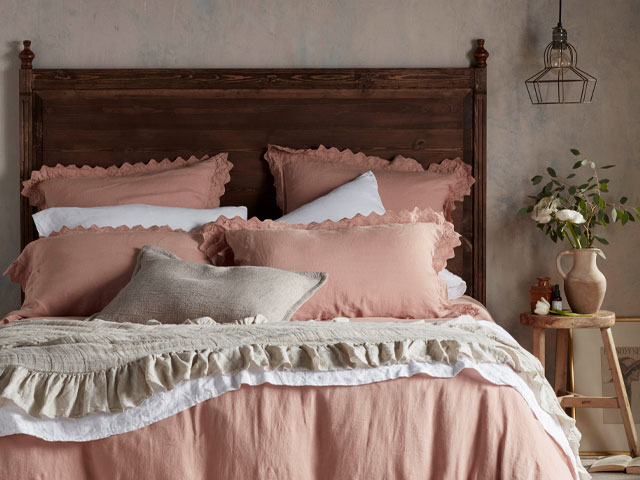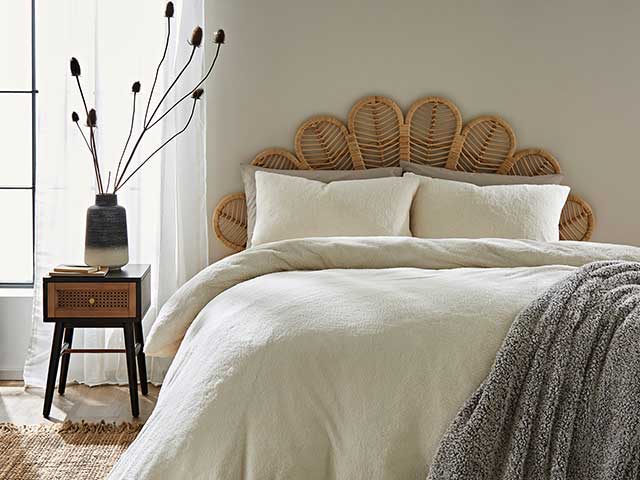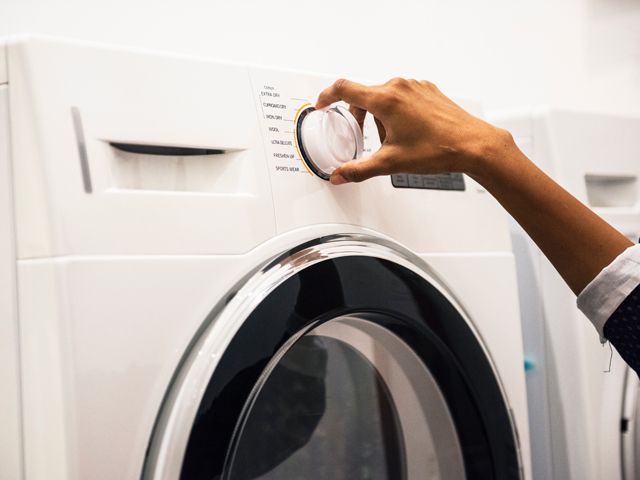
Image Credit: Piglet In Bed
How often should you REALLY wash your bedding during summer?
With the UK already having sweltered through its third heatwave of the summer and temperatures soaring to a beyond balmy 35.8°C, we’ve definitely been feeling the heat.
While we’re quick to open windows and swap duvets for lighter linens, many of us don’t realise that warmer weather means our bedding needs washing more often too.
That’s because sweat, skin oils and humidity create the perfect environment for bacteria and dust mites to thrive, especially during those sticky summer nights, when the average person can sweat between 500ml and 700ml every night.
Although there are no hard rules when it comes to how often you should wash your bedding overall it’s generally suggested we should be washing our bed linen every one to two weeks all year round.
But according to a YouGov study, only 28% of Brits are washing their sheets this regularly, which means a whopping 72% of Brits are changing their bedding far too late, leading to a higher risk of skin and health conditions, acne and more.
And when the mercury rises in the summer, we should be sticking on a bedding load even more frequently.
“The amount of allergens, skin cell build up and sweat that can build up on our bedsheets during the seasons can vary,” explains cleaning content creator, podcaster and author, Laura Mountford, AKA @lauracleanaholic.
“The hot weather causes more skin oils, higher pollen levels and increased sweating so I recommend sheets should be washed at least once a week in the summer months.
In the winter you can reduce the frequency of washing the sheets and pillowcases to once every 1-2 weeks.”
But washing our sheets more regularly isn’t the only switch up we should be making to our bedroom laundry schedule.
We spoke to the experts about how to adapt your washing and cleaning regime to counterbalance those sticky summer nights.

How to practice good bedding hygiene in the summer
It’s not just your sheets that need more frequent attention in summer, your pillow and duvet inserts deserve a refresh too.
Warmer nights mean increased sweat and moisture, which can seep through covers and build up over time, so giving inserts a proper wash every few weeks can help keep things hygienic, fresh, and allergen-free.
“When the weather is warmer it is the perfect time to wash your duvets and pillows,” recommends Laura.
“Most pillows are now machine washable and M&S even have machine washable duvets which can be easily cleaned in the machine on a cool wash with a stain removing detergent like the Ariel The Big One pods which are ideal for full loads like your bedding.”
If your duvet is too large for the washing machine, try soaking it in the bath with a gentle laundry detergent for a thorough, at-home clean.
For those who can fit their duvet and pillow inserts in the machine Laura recommends adding an extra spin to remove as much moisture as possible from them.
“Be sure to fluff them up when you remove them from the drum to ensure that they do not lose their shape,” she adds.
“Drying them in the tumble dryer also helps to keep them fluffy.”
Laura says we should be aiming to wash our duvet and pillow inserts once every six months, but more frequently in the summer.
“Pillow protectors are a brilliant way to keep your pillows cleaner and these can be washed weekly in the summer with your pillowcases,” she adds.

How frequently should we be washing other summer bedroom items?
Pillowcases – once a week
Much like your other basic sheets, pillowcases should be washed at least once a week.
“Pillowcases make contact with your head and face every night so it’s worth considering the amount of oil and sweat that are released from your pores and onto the pillowcase, which can quickly accumulate to significant amounts of dirt,” explains Jordan Burns from Eachnight.com.
If you fail to wash your pillowcases once a week, resting your head on a dirty cover can drastically increase the chances of summer breakouts, acne, and skin rashes.
“Regularly washing pillowcases could help reduce breakouts for those who suffer from acne and pimples,” Jordan adds.

Blankets – every two weeks
Blankets are a bit of a tricky one as it really depends on how much you’re using them in summer.
“If you use your blanket every night, you’ll want to wash it once every two weeks at least as it can gather a similar level of dirt as your duvet or sheets,” suggests Jordan.
“On the other hand, if your blanket only gets used once in a blue moon, you can go three months without washing it, no matter the season.
Matresses – twice a year
Mattresses really only need to be washed once or twice a year.
“Of course, if you drop or spill something on it, you should wash it immediately to avoid it staining,” Jordan explains.
“To prevent your mattress from getting dirty more often and therefore needing to clean it regularly, a high-quality mattress protector can be put on top and this can go a long way in keeping your mattress well maintained.”
Jordan says a mattress protector acts as a shield between you and the mattress and can significantly extend your mattress’s life.
“It will also help keep your mattress clean, often absorbing spills and stains instead of allowing them to seep through,” he adds.
“As such, a mattress protector should be washed every month or sooner in the case of a spillage.”

How to extend the time between washing your bed linen in the summer?
Laura says there are a few ways to extend the time between washes if washing your linens once a week (or more often) isn’t practical, including showering before bed to lessen the amount of perspiration, oil, and grime you carry into bed and making sure you thoroughly cleanse your face.
“I always like to have a shower before bed, not only to help me relax but also because this is also a great way to keep your bedding cleaner for longer too,” she explains.
“I have always struggled with sensitive skin and acne so my best advice is to wash your pillowcases more frequently if you struggle with your skin too,” Laura continues.
“Your pillows collect dead skin cells and oil which can clog your pores and cause inflammation so by keeping them as clean as possible, you should really notice a difference.”
The upside to washing bedding more often in summer
No one’s jumping for joy at the thought of extra chores in the summer heat, but there is an upside to having to wash your bed linen more frequently.
Warm, sunny days mean your bedding can dry in no time.
In fact, you might be able to wash your sheets and have them back on the bed before the day’s out (and they’ll smell even better for it).
The trick to making it stress-free?
Always have at least two sets of bedding per bed.
There’s nothing worse than realising you’ve stripped the bed and forgotten to put fresh sheets on, just as you’re ready to crawl in.

Other summer bed hygiene tips
Switch up your bedding
Opt for breathable, antimicrobial fabrics like cotton, linen, or bamboo for your sheets and mattress protectors.
These natural, moisture-wicking materials allow air to circulate and help keep sweat at bay – making your bed feel fresher for longer and less inviting to bacteria and other nasties.
The fabrics you use for your summer bedding can also make a difference to how well you sleep in the stifling heat.
“I love to use breathable fabrics like linen and cotton for my bedsheets,” explains Laura.
“It is definitely worth investing in quality bedding for optimum sleep and to keep you cool in the summer.
“My favourite brands are Piglet in Bed, The White Company, M&S and I’ve even found some great value high quality bedding on Amazon recently.”

Deep clean your mattress
Giving your mattress a deep clean once a month will help keep it fresh and hygienic.
Use a vacuum with an upholstery attachment to lift away dust, dead skin, and other build-up, and follow up with a sprinkle of baking soda to help tackle hidden microbes.
Don’t make your bed
Stripping off the bedding and letting your mattress air out for a few hours each week (preferably when it’s dry out) helps moisture evaporate and keeps mould and mildew at bay.
Try a dehumidifier
Reducing excess moisture in the air makes it harder for bacteria, dust mites, and mould to thrive.
Upgrade your mattress and bedding
If your mattress is pushing 6–8 years, or your pillows are starting to feel lumpy or a bit pongy, it might be time to part ways.
No matter how often you clean them, older bedding can hang on to bacteria and allergens that you’re better off without.
Looking for more interiors inspiration? Take a look at Hurkle durkle interiors: 9 ways to get the cosycore look in your home or Labubu interiors have arrived! 11 ways to embrace ‘cutecore’ in your home
READ MORE:





